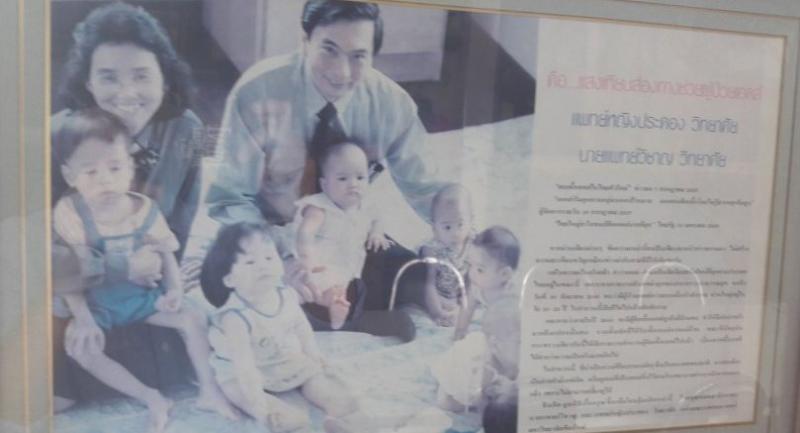Giving new life to HIV-positive children

Prakong has been like a mother to more than 500 abandoned or orphaned affected kids.
DURING THE past few decades, Dr Prakong Vithayasai has been an angel to children living with HIV in Thailand.
She has been like a mother to 530 children who have been abandoned or orphaned because of AIDS. Under her care, they have been nursed back to health, given a home and provided with educational opportunities.
“They can further their education as much as they like. Some of the children under my care have graduated with master’s degrees,” Prakong, 73, said proudly.
She and her husband Dr Vicharn Vithayasai, now 78, never expected anything in return when setting up the first shelter for HIV-positive children in 1980s – at a time when Thailand still knew very little about AIDS.
“Back then, we worked at Suandok Hospital [known today as Maharaj Nakorn Chiang Mai Hospital]. My husband was a paediatrician specialising in infectious diseases and I am a doctor in internal medicine,” Prakong said. “He noticed that many children fell ill because of HIV infections and ended up being left at the hospital.”
When Vicharn told her of the problem, she agreed to set up the Ban Kua Darun shelter for children. In Thai, ban means home, kua means support and darun means children.

“We took in seriously-ill children whom their family and the hospital did not want to take care of anymore,” Prakong said. “These children could not be transferred to orphanages because those facilities could not provide long-term care to HIV-positive children at that time.”
Prakong and her husband were determined to create a good home for the children to prove to other organisations that they could grow up and develop just as well as anyone else.
Ban Kua Darun later evolved into Support the Children Foundation, which was established in 1992. Vicharn is president, while Prakong is a board member.
“At its peak, the foundation operated four Ban Kua Darun shelters in four locations around Chiang Mai province,” Prakong said. “Each shelter took care of six children at a time.”
She admitted that it was not easy to treat HIV-positive children at that time, particularly those with serious symptoms, because of limited resources and knowledge. Despite their best efforts, 25 children died in the first five years.
But their efforts finally paid off. No more HIV-positive children have succumbed under Prakong’s care after that initial five-year phase.
Over time, Prakong intensively studied the medical condition to become an expert on HIV/AIDS.
That mission of self-education was made all the more difficult by the overriding priority of raising funds to keep the shelters operating.
“Our biggest problem was money. Back then, medicines were expensive and not provided for free by the government,” she said, adding that medicine alone cost her foundation up to Bt4.3 million a year.
She recounted how she used to ask for financial donations from people she met.
She also tried to find foster parents for HIV-positive children, as she believed it would be best for children to grow up in normal surroundings – not ones designed specially for kids with HIV.
If relatives were willing to take in the children, they received support from the foundation such as vocational training and financial support.

One 21-year-old student at a state university, referred to by the pseudonym “Karn”, said she had received help from Prakong since she was five
“My parents died when I was four,” she said. “It’s the foundation that has given me support and scholarships.”
Karn described Prakong as a good-hearted and kind woman.
“She has never tried to dictate the lives of children under her care. She has given us opportunities and let us choose the path ourselves,” she said.
Prakong only requires children to write to her constantly.
“It’s the way I know about their lives and problems,” Prakong said. “If they have any issue, I am ready to stand up for them.”
At present, the Support the Children Foundation still cares for 36 HIV-positive children.
“I think I will not take in more children. These days, no HIV-positive children are abandoned at the hospitals,” the elderly doctor said slowly. “My duty will end when the children currently under my care grow up fine.”
Prakong, who is recovering from a stroke, said the children under the care of the foundation were like her own children.
“And as a mother, I don’t want anything from them. I am already happy to see them grow up and live happy lives,” Prakong said.
Her life’s work has not gone unrecognised, however, as she is the recipient of many national and international awards for her dedication in fighting AIDS and helping children living with HIV.
Note: To mark WORLD AIDS DAY on December 1, The Nation has prepared a three-part series: The first features Dr Prakong Vithayasai, the second addresses Thailand’s goal to “Ending AIDS” by 2030, and the third covers the life of a same-sex couple with one partner being HIV-positive.
Box:
Mother-to-children transmissions are the main cause of HIV infections in children.
Without preventive measures, 25 to 40 per cent of babies born to HIV-positive women are infected.
In Thailand, the HIV infection rate during pregnancy is 0.5 per cent. The HIV infection rate during child delivery is 1.6 per cent.
